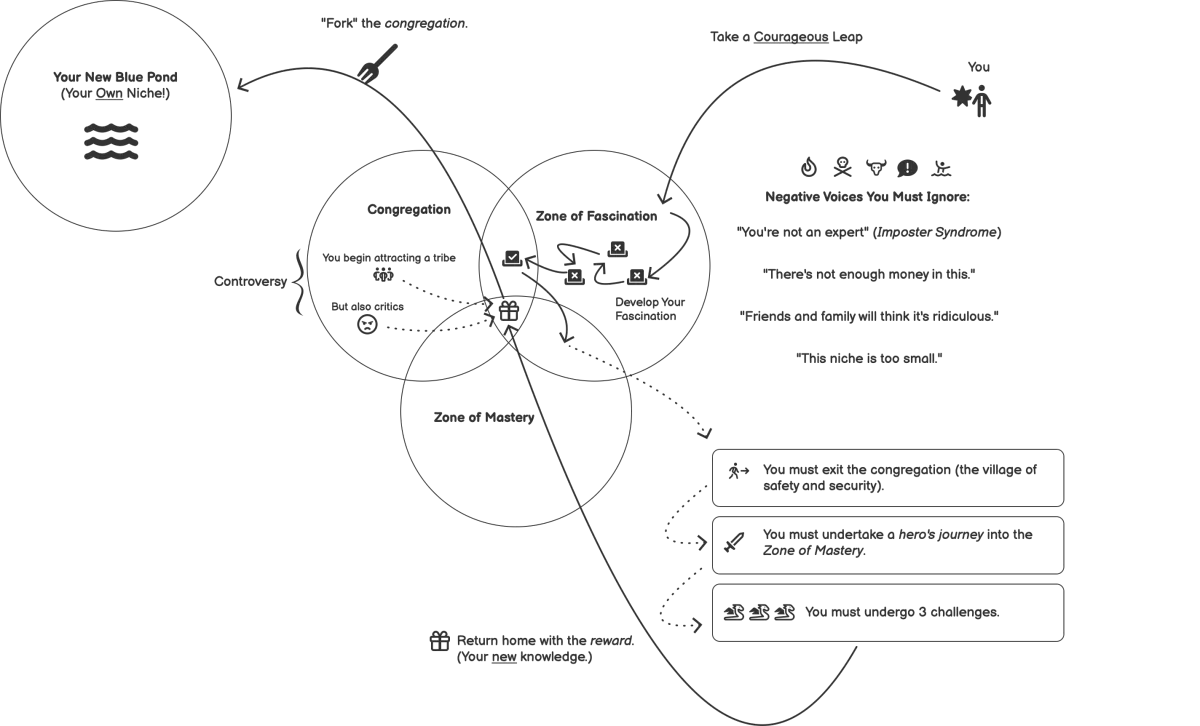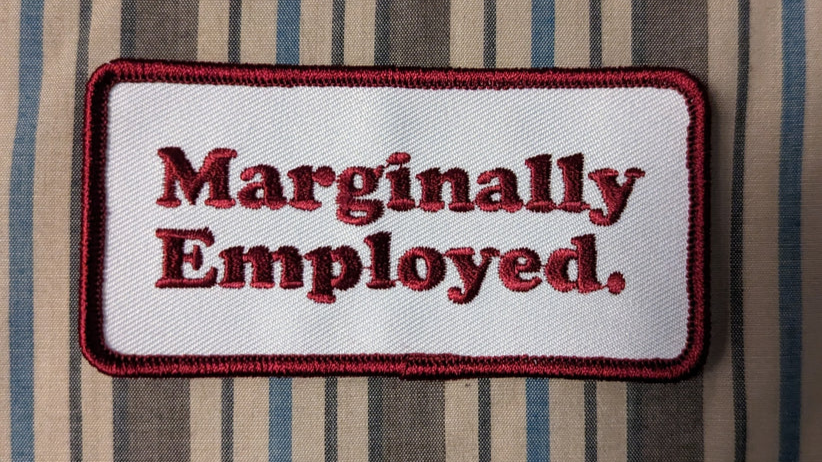Avoiding the 'Dark Triads'
Arthur C. Brooks, whose writing I always enjoy, writes on sociopaths, narcissists, and ‘Dark Triad’ personalities. These Dark Triads are characterised by narcissism, Machiavellianism, and psychopathy. They’re manipulative and harmful, and making up about 7% of the population — although interestingly significantly more of the male prison population.
Brooks talks about how to spot and avoid them in the workplace and on social media, and how to gravitate towards ‘Light Triad’ personalities instead. These embody positive traits like faith in humanity and humanism, and represent a more uplifting aspect of human nature. Thankfully, Light Triads are more common in the general population.

As far as the workplace is concerned, scholars have found that narcissists tend toward artistic, creative, and social careers; researchers also saw that Machiavellians, in particular, avoid careers that involve caring for others. Look out for Dark Triads, in other words, in professions that involve human contact, performance, and applause, but little concerned attention to other people. An obvious example might be politics; another would be show business. But the type can manifest in many careers and professions. At work, such individuals tend to exaggerate their own worth, show a distrustful attitude toward colleagues, act impulsively and irresponsibly, break rules, and lie.Source: The Sociopaths Among Us—And How to Avoid Them | The Atlantic[…]
The traits to look for are self-importance, a sense of entitlement, vanity, a victim mentality, a tendency to bend the truth or even openly lie, manipulativeness, grandiosity, a lack of remorse, and an absence of empathy. Probe for these characteristics particularly when on first dates and in job interviews. You might even want to take that test imaginatively on behalf of someone you suspect may have Triad traits and see what result you get.
Image: DALL-E 3
The 9-5 shift is a relatively recent invention
As a Xennial, I have all of the guilt for not working hard enough — along with a desire to live a life more fulfilling and holistic than my parents. Generations below, including Gen Z and then of course my kids, think that working all of the hours is a bit crazy.
This article is about a viral TikTok video of a Gen Z ‘girl’ (although surely ‘young woman’?) crying because the 9-5 grind is “crazy… How do you have friends? How do you have time for dating? I don’t have time for anything, I’m so stressed out.”
It’s easy, as with so many things, for older generations to inflict on generations coming after them the crap that they themselves have had to deal with. But it doesn’t have to be this way. As the article says, the 9-5 job is a relatively recent invention and I, for one, don’t follow that convention.
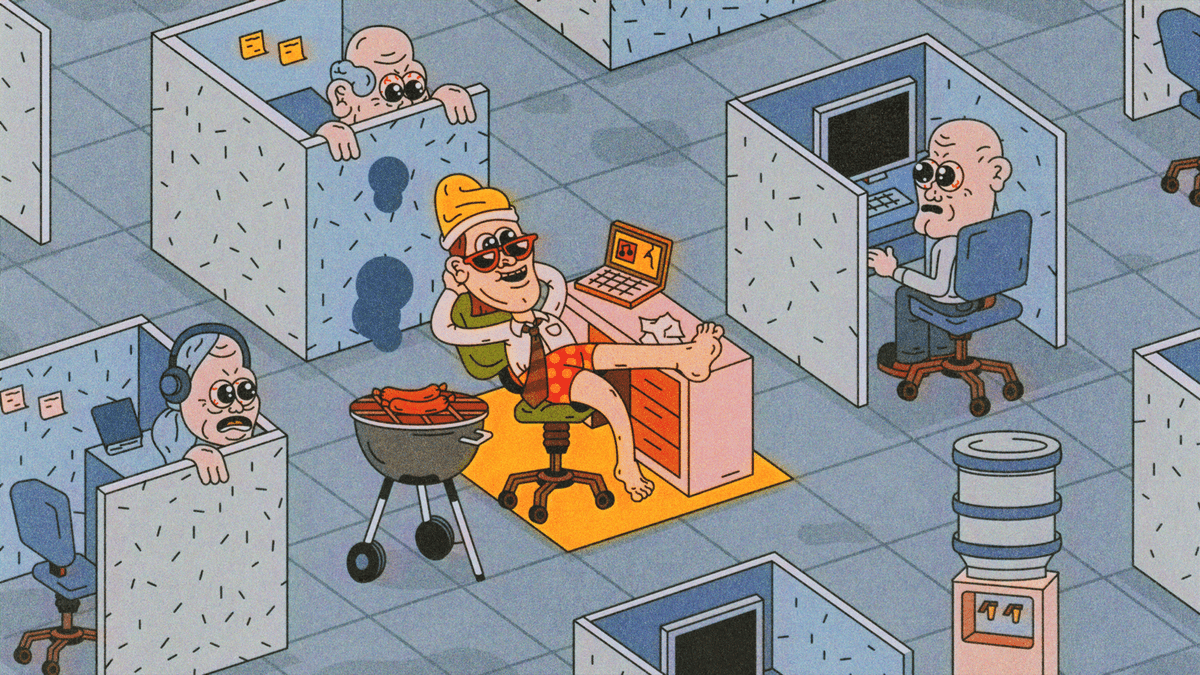
When the video – which has been viewed nearly 50 million times across TikTok and Twitter – first started to spread, the comments weren’t sympathetic. She was trashed by neoliberal hustle and grind stans – most of whom seemed old enough to be her parents. “Gen Z girl finds out what a real job is like,” one X (formerly Twitter) user sneered. “Grown-ups don’t prioritise friends, or dating. Grown-ups prioritise being able to provide,” another commenter wrote, neglecting the fact that if you’re young, single, and have no friends, there isn’t really anyone to “provide” for.Source: Nobody Wants Their Job to Rule Their Lives Anymore | VICEBut then the tide began to turn. People started to point out that “Gen Z girl” was right, actually. Work sucks! No one has any time for anything! Within days, she had become the figurehead for an increasingly common sentiment: We don’t want our lives to revolve around work anymore.
[…]
It doesn’t feel like an exaggeration to say young people have been gaslit by older generations when it comes to work. As wages stagnate and costs rise, the generation that got free university education and cheap housing have somehow convinced young people that if we’re sad and stressed then it’s simply a problem with our work ethic. We’re too sensitive, entitled, or demanding to hold down a “real job”, the story goes, when really most of us just want a decent night’s sleep and less debt.
[…]
It’s always worth reminding ourselves that the 9-5 shift is itself a relatively recent invention, not some sort of eternal truth, and hopefully soon we’ll see it as a relic from a bygone age. “It was set up to support our patriarchal society – men went to work and women stayed at home to cook and look after the family,” says Emma Last, founder of the workplace wellbeing programme Progressive Minds. “Things have obviously changed a lot since then, and we’re trying to find the balance between cooking meals, looking after ourselves, spending time with family and friends, and having relationships. Isn’t it a good thing that Gen Z are questioning it all?”
Overemployment as anti-precarity strategy
Historically, the way we fought back against oppressive employers and repressive regimes was to band together into unions. The collective bargaining power would help improve conditions and pay.
These days, in a world of the gig economy and hyper-individualism, that kind of collectivisation is on the wane. Enter remote workers deciding to take matters into their own hands, working multiple full-time jobs and being rewarded handsomely.
It’s interesting to notice that it seems to be very much a male, tech worker thing though. Of course, given that this was at the top of Hacker News, it will be used as an excuse to even more closely monitor the 99% of remote workers who aren’t doing this.

Holding down multiple jobs has long been a backbreaking way for low-wage workers to get by. But since the pandemic, the phenomenon has been on the rise among professionals like Roque, who have seized on the privacy provided by remote work to secretly take on two or more jobs — multiplying their paychecks without working much more than a standard 40-hour workweek. The move is not only culturally taboo, but it's also a fireable offense — one that could expose the cheaters to a lawsuit if they're caught. To learn their methods and motivations, I spent several weeks hanging out among the overemployed online. What, I wondered, does this group of W-2 renegades have to tell us about the nature of work — and of loyalty — in the age of remote employment?Source: ‘Overemployed’ Workers Secretly Juggle Several Jobs for Big Salaries | Business Insider[…]
The OE hustlers have some tried-and-true hacks. Taking on a second or third full-time job? Given how time-consuming the onboarding process can be, you should take a week or two of vacation from your other jobs. It helps if you can stagger your jobs by time zone — perhaps one that operates during New York hours, say, and another on California time. Keep separate work calendars for each job — but to avoid double-bookings, be sure to block off all your calendars as soon as a new meeting gets scheduled. And don’t skimp on the tech that will make your life a bit easier. Mouse jigglers create the appearance that you’re online when you’re busy tending to your other jobs. A KVM switch helps you control multiple laptops from the same keyboard.
Some OE hustlers brag about shirking their responsibilities. For them, being overemployed is all about putting one over on their employers. But most in the community take pride in doing their jobs, and doing them well. That, after all, is the single best way to avoid detection: Don’t give your bosses — any of them — a reason to become suspicious.
[…]
The consequences for getting caught actually appear to be fairly low. Matthew Berman, an employment attorney who has emerged as the unofficial go-to lawyer in the OE community, hasn’t encountered anyone who has been hit with a lawsuit for holding a second job. “Most of the time, it’s not going to be worth suing an employee,” he says. But many say the stress of the OE life can get to you. George, the software engineer, has trouble sleeping at night because of his fear of getting caught. Others acknowledge that the rigors of juggling multiple jobs have hurt their marriages. One channel on the OE Discord is dedicated to discussions of family life, mostly among dads with young kids. People in the channel sometimes ask for relationship advice, and the responses they get from the other dads are sweet. “Your regard for your partner,” one person advised of marriage, “should outweigh your desire for validation."
There are better approaches than just having no friends at work
We get articles like this because we live in a world inescapably tied to neoliberalism and hierarchical ways of organising work. I’m sure the advice to “not make friends at work” is stellar survival advice in a large company, but it’s not the best way to ensure human flourishing.
I’ve definitely been burned by relationships at work, especially earlier in my career when managers use the ‘family’ metaphor. Thankfully, there’s a better way: own your own business with your friends! Then you can bring your full self to work, which is much like having your cake and eating it, too.

Real friends are people you can be yourself around and with whom you can show up being who you truly are—no editing needed. They are folks with whom you have developed a deep relationship over time that is mutual and flows in two ways. You are there for them and they are there for you. There is trust built.Source: Why You Shouldn’t Make Friends at Work | Psychology Today CanadaAt work, this relationship becomes very, very complex. Instead of being a true friendship, what ends up happening is that the socio-economic realities of your workplace come into play—and most often that poisons the well. When money is involved, it clouds any potential friendship. It makes the lines so blurry between real and contrived friendships that the waters become too murky to make clear and meaningful relationships. Is that a real friend, or do they want something from me that benefits them? Who can you really trust at work and what happens if they violate your trust? Is my boss really my friend or are they just trying to get me to work harder/longer/faster?
If, instead, we keep clear boundaries at work, we never fall into the trap of worrying about whom to trust and who has our best interest in mind. It prevents us from transferring our best interests to anyone else simply because we assume they are our friends. Why give that amazing power to someone else at work only to be disappointed?
Worse yet, people will often confuse co-workers with family, falling into the trap of having a “work mom,” “work dad,” or even a “work husband” or “work wife.” This can lead to a number of disastrous results that are well-documented, as family is not the same as work, and confusing the two has long-lasting ramifications that can stifle career success and lead to unethical behaviour. Keeping boundaries clear and your work life separate from your private life will help to alleviate this potential downfall and keep you focused on what really matters: the work.
Image: DALL-E 3
Monetising a hobby is different to solving a difficult problem for people ready to pay
Life is never as simple as a 2x2 matrix, but they’re incredibly useful for helping illustrate a key message. In this post, Seth Godin uses one to make the obvious-if-you-think-about-it point that trying to monetise a hobby is a different thing to solving a difficult problem for a group of people who are willing to pay for a solution.
I’ve been thinking about this kind of thing a lot recently given the ongoing need for WAO business development. The advice, which I’m sure is extremely sound, is to find a group of people or type of organisation that you “wish to serve” and then find out as much about them as possible so you can solve their problem.
The trouble is that… doesn’t sound very interesting? Perhaps I’m wrong, and I reserve the right (as ever!) to change my mind, but I’d rather follow my interests and try and find aligned people and organisations willing to pay for the outputs.
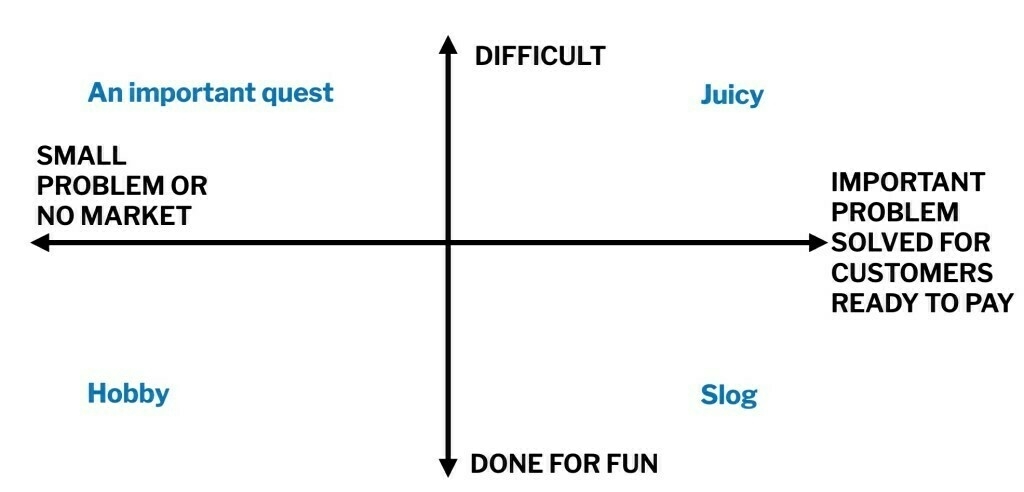
All too common are ‘fun’ businesses where someone finds a hobby they like and tries to turn it into a gig. While the work may be fun, the uphill grind of this sort of project is exhausting. If it’s something that lots of people can do and that customers don’t value that much, it might not be worth your time. Taking pictures, singing songs or playing the flute are fine hobbies, but hard to turn into paying jobs.Source: The slog, the hobby and the quest | Seth’s BlogOn the other hand, in the top right quadrant, there’s endless opportunity and plenty of work for people who can do difficult (unpopular) work that is highly valued by customers who are ready to pay to solve their problems. A forensic accountant gets more paid gigs than a bagpipe player.
People quit managers, not jobs
It turns out that the saying that “people quit managers, not jobs” is actually true. Research carried out by the Chartered Management Institute (CMI) shows that there’s “widespread concern” over the quality of managers. Indeed, 82% have become so accidentally and received no formal training.
I’ve had some terrible bosses. I don’t particularly want to focus on them, but rather take the opportunity to encourage those who line manage others to get some training around nonviolent communication. Also, let me just tell you that you don’t need a boss. You can entirely work in a decentralised, non-hierarchical way. I do so every day.

Almost one-third of UK workers say they’ve quit a job because of a negative workplace culture, according to a new survey that underlines the risks of managers failing to rein in toxic behaviour.Source: Bad management has prompted one in three UK workers to quit, survey finds | The Guardian[…]
Other factors that the 2,018 workers questioned in the survey cited as reasons for leaving a job in the past included a negative relationship with a manager (28%) and discrimination or harassment (12%).
Among those workers who told researchers they had an ineffective manager, one-third said they were less motivated to do a good job – and as many as half were considering leaving in the next 12 months.
Image: Unsplash
In the long run, people can only treat you the way you let them
This blog post, which I discovered via Hacker News, is about ultimatums around ‘return to office’ mandates/ultimatums. But it’s also a primer to only allow people to treat you the way you want to be treated.
People who abuse any power they have over you aren’t worth respecting and definitely aren’t worth hanging around. Although sometimes it’s difficult to realise it, the chances are that you’re bringing the talent to the table, which is why they acting in a way fueled by insecurity.
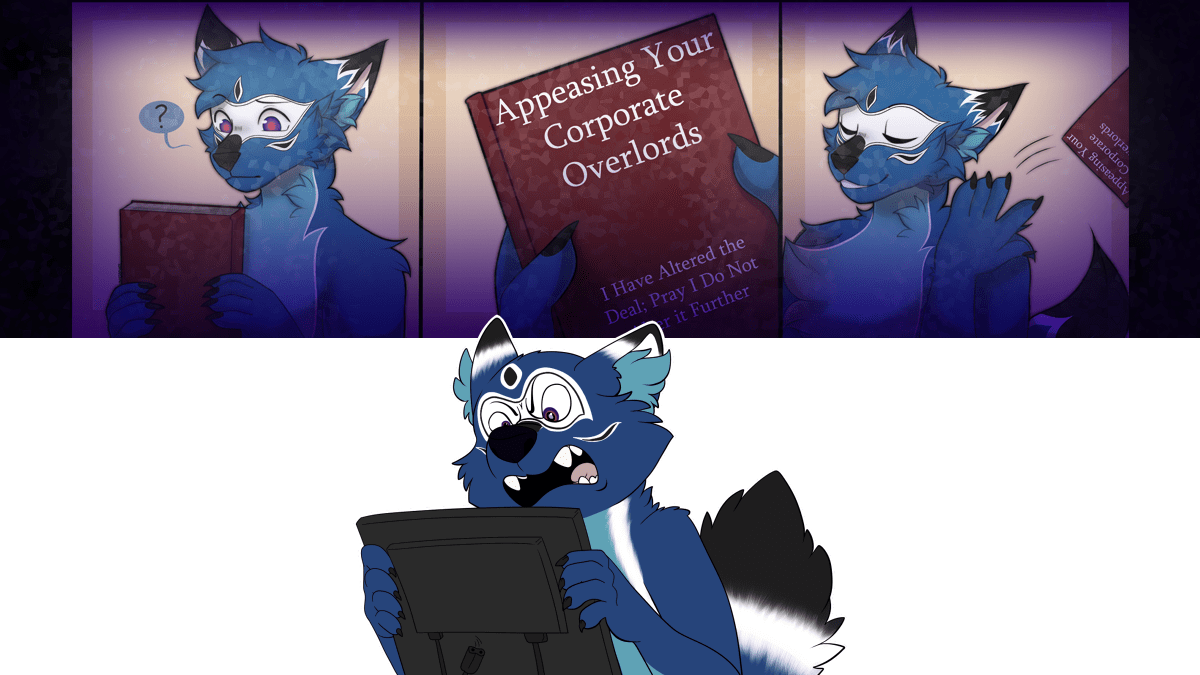
If I had to give only one bit of advice to anyone ever faced with an ultimatum from someone with power over them (be it an employer or abusive romantic partner), it would be:Source: Return to Office Is Bullshit And Everyone Knows It | Dhole MomentsUltimately, never choose the one giving you an ultimatum.
If your employer tells you, “Move to an expensive city or resign,” your best move will be, in the end, to quit. Notice that I said, ‘in the end’.
It’s perfectly okay to pretend to comply to buy time while you line up a new gig somewhere else.
That’s what I did. Just don’t start selling your family home or looking at real estate listings, and definitely don’t accept any relocation assistance (since you’ll have to return it when you split).
Conversely, if you let these assholes exert their power over you, you dehumanize yourself in submission.
Migraines and 'ability'
Granted it’s been over a decade, but when I worked at a university I had to be on the ‘disabled’ register due to my migraines. That meant my line manager could make accommodations such as being sat next to a window so the fluorescent lights didn’t trigger me.
Almost everyone I know has some kind of medical condition which affects their work to a greater or lesser extent. These are the things that we used to hide, until we realised (perhaps for the first time during the pandemic) that we’re all just temporarily abled.
This letter in The Guardian is a response to an article about a minister setpping down due to chronic migraines. I don’t get 15 or more a month, as she does, but I probably average 3-4 and, because they add up, it’s imperative that I have flexible working conditions. But then, shouldn’t we all?

Dehenna Davison has resigned as a minister, citing chronic migraines (Report, 18 September). Migraines are a common and debilitating condition affecting many people; chronic migraine is defined as an ongoing experience of 15 or more migraine days a month. So it is not difficult to imagine how hard it has been for Ms Davison to give the energy she wants to her role.Source: People living with migraines need better support from employers | The GuardianBut while it is valuable that chronic migraines have been given some media attention, it is also troubling that the message is, unfortunately, that those with such conditions do not have equal value and should quit if they can’t manage the job – a message that many people living with migraines and other long-term conditions and disabilities will be familiar with, whatever their role or employer.
Managing work, life and migraines takes more than the “patience at times” that Davison thanks her colleagues for. It needs recognition, respect and a commitment from employers to prioritise the health of workers and support them to work with the condition, not drop back because of it.
Anna Martin Oxford
No career progression on a dead planet
There’s a film starring Matt Damon called Elysium from 2013 in which the wealthy live on a man-made space station in luxury, while the rest of the population live on a ruined Earth. With the latest announcement about a new huge oilfield being opened in the North Sea, the obscene desire for global elites to put profit before planet is clear for all to see.
As we hurtle towards this scenario, many have realised that there is no longer any link between meaningful work, a decent salary, and a fulfilling life.

James, a 31-year-old in Glasgow, had always worked hard, from striving for a first at university to working until 8pm or 9pm at the office in the civil service in the hopes of getting noticed.Source: ‘It felt futile’: young Britons swap career-driven lives for family and fun | The GuardianBut during lockdown in 2020, James had an epiphany about what he valued in life when reading the book Bullshit Jobs by the anthropologist David Graeber. “He talks a lot about how jobs that provide social utility are generally pay-poor while the inverse are paid more,” James says.
James felt he was working doggedly – but not necessarily either generating public good or building a stable financial life. “It felt futile … You can work really hard and you’re still not going to get ahead,” he says.
“Salaries and housing costs are so mismatched at this point that you would really need to jump ahead in your career to be able to buy in parts of the country. Not that [owning property] is the be-all and end-all, but it’s kind of a foundation to having financial stability.”
He now focuses on his life, putting his phone on aeroplane mode while doing activities such as hiking, reading and watching films. “I still value work, I’m very committed to my position. But I’ve just realised that this myth a lot of millennials were told – graft, graft, graft and you’ll always get what you want – isn’t necessarily true,” James says. “It’s a reprioritisation.”
Social mobility in the UK is at its worst in more than 50 years, a recent study from the Institute for Fiscal Studies found, with children from poor households finding it harder than 40 years ago to move into higher income brackets. The IFS said gifts and inheritances from older generations were becoming more important to household incomes.
If your heart isn’t it, it’s probably because there’s no heart anywhere in the process
One thing I’ve learned spending over a decade thinking about Open Badges and alternative credentials is that hiring is broken. Although there are mitigations and workarounds — some of which I’ve implemented when hiring a team and helping others do so — the whole thing is a dumpster fire.
This article by Paul Fuhr discusses the horror show that is job hunting in the age of platforms such as Indeed. He does a great job of showing how automated and dehumanising the whole hiring process is. Platforms are more focused on user engagement than genuinely aiding job seekers; applicants are reduced to mere data points.
Not only that, but the lack of human-centricity to the whole thing fails to accommodate those with non-linear careers while simultaneously trivialising the job search process. Unsurprisingly, he’s calling for root-and-branch reform of the current job market. I can’t help but think that badges and alternative credentials can make the whole thing more transparent and fair, moving away from automated metrics.
I’ve applied for (quite literally) thousands of jobs. Very quickly, I went from being surgically precise about job applications to taking a shotgun-blast approach to it all, spraying applications out in every direction. I’ve clicked the “Submit” button on countless career sites. I’ve created four different versions of my resume. I’ve spent more time on LinkedIn than any other site, too, though I suspect Reddit is happy to have some server bandwidth back.Source: Why Resumes Are Dead & How Indeed.com Keeps Killing the Job Market | Paul FuhrSearching for a steady job is a disheartening and depressingly tedious affair, but it doesn’t have to be. If I’m qualified for anything at the moment, though, it’s being qualified to weigh in on the contemporary job-search experience. I know what it is, what it isn’t, what it pretends to be, why it no longer works, and what needs to change. And thanks to a year-plus of trying to find consistent work, it’s no longer about connecting me with the job of my dreams — it’s about connecting me with my dream of simply having a job.
[…]
Machine learning, AI, automation, yadda yadda yadda. I get it. I understand the “why” of automating the hiring process; I even think it can be a helpful (jargon alert) “arrow in the quiver” for HR. I can’t even imagine a single HR specialist being tasked to locate the right candidate from a huge field of applicants for one job, let alone fifteen jobs at once. That’s like finding a needle in a stack of needles. It’d be paralyzing.
That said, hiring managers and job seekers have arrived at a truly dangerous intersection. Employers have allowed automation to creep in and govern so much of the HR process that it threatens to ignore the whole…well, you know, human part of it all. And some companies insist on doubling-down on this façade; I’ve visited a shocking number of sites that pretend to have an actual human person ready to chat with you (certainly not a bot!), as if they’re impossibly waiting 24/7 to answer your questions.
We’re at a maddeningly mindless moment when it comes to finding employment, but it’s one that could be repaired with some maddeningly simple ideas. For starters, just bring back some humans. Robots can parse your past and distill you down into data, but they’ll never make a genuine connection or get a sense of you are. Also, simplicity works both ways: it benefits the applicant as much as an HR specialist.
This isn't working. Can we talk about that?
Thankfully, there’s no-one calling me back into the office. But this post is about people who are being recalled — as well as those working in sub-optimal remote settings.
This post suggests that the phrase “this isn’t working” should be viewed as an invitation for dialogue rather than a threat, arguing that open communication is crucial for things inadequate in the workplace.

The Future of Work conversation is full of rejected gifts. We've seen bosses throw "this isn't working" back in employees' faces as "entitlement." As "millennials." As "no one wants to work anymore." We've seen employees throw it back in their CEO's face, too, as "outdated." Or "boomers." Or "something something commercial real estate." As far as we can tell, that point-scoring hasn't gotten us any closer to the future we're all trying to build.Source: Sorry I’m getting kicked out of this room | Raw Signal GroupWe know that everyone’s sick of constantly redesigning the rules of work. There’s this revisionist nostalgia for, in some quarters, 2019. And in others, 2021. We know that some of you have built systems here in 2023 that are working for you, and you would like them to please just stay put for a goddamned minute. We get that. But when someone tells you that those systems aren’t working for them, shouting them down won’t give you the peace and quiet you want.
[…]
By all means, read what other orgs are doing. Maybe there are things you can learn from what Apple does, or Google, or Smuckers. But there’s no shortcut around the conversation. Every sales person, fundraiser, marketer, product leader, and designer will tell you the same thing. You have to talk to people to know if you’re actually reaching them. To know if any of your solutions actually solve the problem.
What's good for us is also good for the planet
I came across this via Dense Discovery, which is one of a number of additional newsletters to which I would recommend Thought Shrapnel readers subscribe.
In this article, Erin Remblance shows how modern lifestyles, particularly in wealthy nations, have led to a loss of human connection and an increase in mental health issues. She suggests that the shift from community-oriented activities to individualistic, consumer-driven behaviour has not only harmed our well-being but also contributed to the climate emergency.
The solution? Returning to simpler, more sustainable ways of living that focus on human connection and creativity. By becoming creators rather than mere consumers we can improve our mental health and simultaneously benefit the planet.

One of the top 5 regrets of the dying is that they wished that they hadn’t worked so hard. Another is that they wished they’d been brave enough to pursue the life they’d really dreamed of, without worrying about what others thought; that they’d had the courage to do the things that made them truly happy. Which is ironic, really, because according to the 18th century economist and philosopher, Adam Smith, wealth is something that is “desired, not for the material satisfaction that it brings, but because it is desired by others”. People are getting to the end of their lives regretting that they worked so hard – often to accumulate wealth so that others could envy it – wishing that instead they had pursued things that truly made them happy regardless of what people thought. What a lesson we could learn from these people’s dying realisations.Source: We are not supposed to live like this | Erin Remblance[…]
Reducing our consumption is of course important for the health of the planet, but what if one way to do this is by becoming producers, or creators, ourselves? Rediscovering what our human-energy – an abundantly available energy we seem to be using increasingly less of – can achieve, something we once innately drew upon, now buried deep within us as fossil-fuelled energy has overtaken our lives. There’s a clear link here to actions that will mitigate climate change: walking, cycling, growing our own food, and other low-tech solutions such as repairing and fostering community that encourages “social connections … rather than fostering the hyper-individualism encouraged by resource-hungry digital devices.”
[…]
We are not supposed to live like this, and it shows. We can see it in the deterioration of mental and physical health of people in so called ‘wealthy’ nations, in the exploitation of people in the Global South, and we can see it in the planetary-wide ecological crisis we face. What if, in trying to heal ourselves, we also begin to heal the planet? Because, in a wonderful turn of events, it would seem that what is good for us, is good for the planet too.
Noise and working from home
I’ve worked from home for the last eleven years. For the last nine years, I’ve lived near the middle of a market town in the north east of England. You wouldn’t believe the amount of noise.
As respondents in this Hacker News thread comment, you kind of get used to it, and also work around particularly loud noise. However, the struggle is real and now that my wife and I both work from home it’s a factor in us moving.
I’d second the opinion of the commenter I’ve quoted below about getting headphones with at least two levels of noise cancellation. I bought some Sony WH-CH720N cans when they started building behind my home office and they’ve been a godsend.

My personal experience as a big-city dweller who has also worked for prolonged stints in suburban and very rural places is that the suburban version of this problem can really be the worst of both worlds.Source: Ask HN: How do you deal with never ending noise and distraction WFH? | Hacker NewsWhen I’m vising my parents in the suburbs… its generally quiet, but that one leaf blower 4 doors down or the one garbage truck crawling down the block suddenly becomes the only thing I can focus on. The noises are infrequent and jarring when they occur.
When I’m at home in my city apartment, the background noise is truly constant - it forms a canvas, nothing really jumps out and therefore the level of what it takes to make a distraction is a lot higher.
My practical advice is to explore headphones with passive noise isolation instead of active noise cancelling. The passive isolation is pretty foolproof, even with sudden or extreme changes in background noise content that the active noise cancelling sometimes takes a moment to adjust to (or perhaps try something like working in a coffee shop for an hour to get the other extreme and reset: write emails where distraction is more OK, come home to the relative quiet of the home office for focus time. I’ve also found even a change of scenery can get me into the zone regardless of what is going on environmentally)
Image: Pexels
Developing your niche
The website of the guy behind this post is a bit too heavy on the self-marketing for my liking, but I did like the diagram in this post about developing rather than ‘finding’ your niche.
The diagram is contrasted with the kind of Ikigai approach you usually see which, he points out, doesn’t tell you where to actually start.
First, you need to take a courageous leap.Source: It’s Not about Finding Your Niche, It’s about Developing Your Niche | Scott P. ScheperYou need to ignore the negative voices of self-doubt, and you need to ignore feelings of “imposter syndrome.”
Next, you need to begin exploring the odd thing(s) you find fascinating. I call this phase, the “Zone of Fascination.”
Next, you must find a congregation of people who share your irrational fascination. For myself, I found this in r/Zettelkasten.
After this, you need to exit the congregation and go deeper than anyone else in a specific area. You must undergo three challenges. Think of these as “quests” in a hero’s journey.
The burnout curve
I stumbled across this on LinkedIn. There doesn't seem to be an authoritative source yet other than the author's (Nick Petrie) social media posts, which is a shame. So I'm quoting most of it here so I can find and refer to it in future.
In terms of my own experience, I slid down that slope pretty quickly in my teaching career, and definitely experienced the 'trap' of going back into a similar situation in a different school. It was also toxic as I had been promoted quickly and, looking back, probably beyond my abilities and experience at the time.
But the great thing about this graphic is that it shows that it's possible to dig your way out, as I did, by realising that a different path is possible. It hasn't always been plain sailing, and there have been other, lesser, traumas since. But I've definitely grown from my earlier experiences, and this is a handy chart to show people who are near the bottom of the curve.
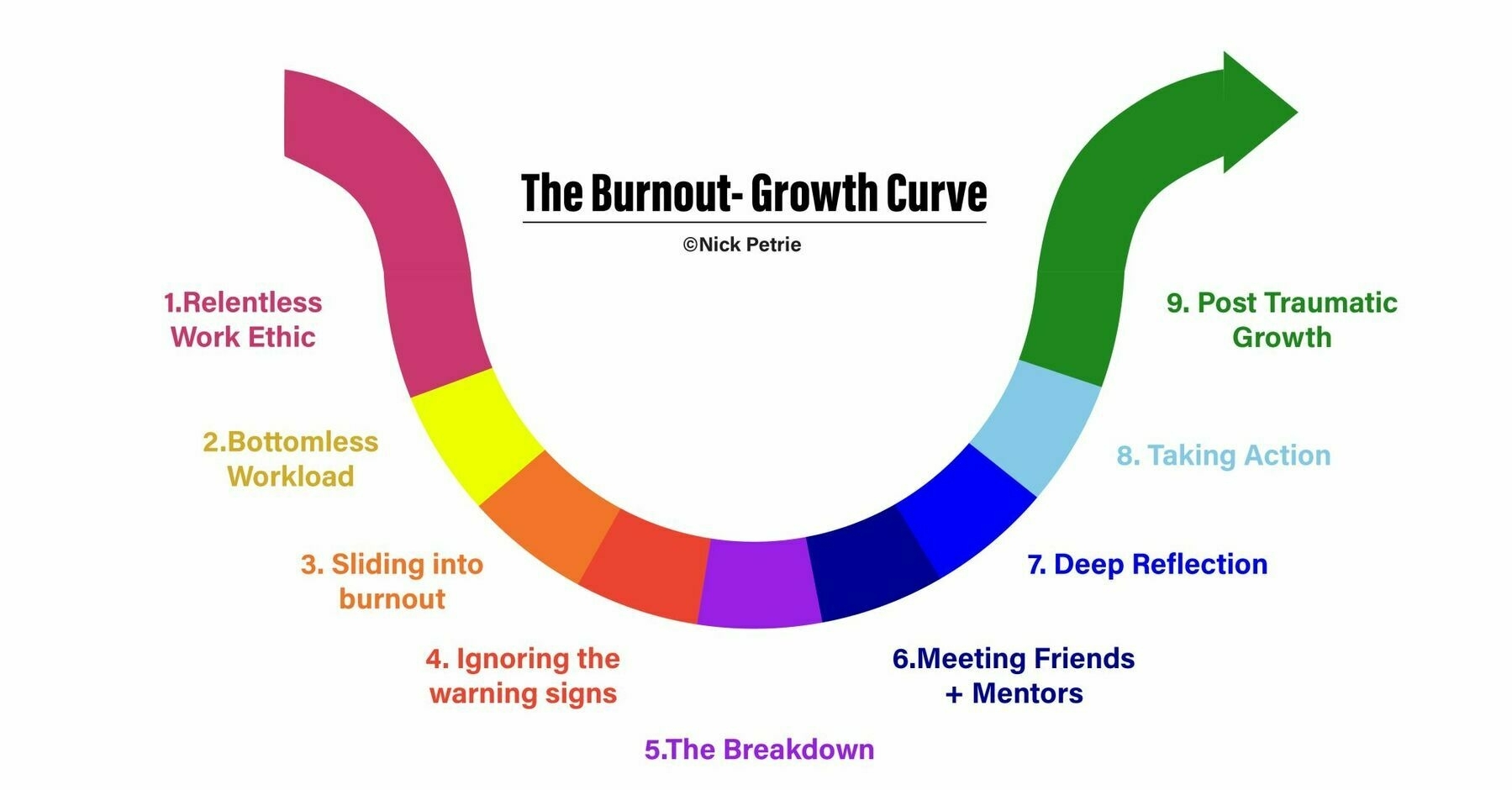
When we interviewed people who had burned out, they told us remarkably similar stories.1. A relentless work ethic – they had a set of beliefs and stories that drove them to work hard - I will deliver, I won’t let people down, I must give 100% at all times.2. Bottomless workload – they joined organizations that rewarded their work ethic with endless work. The harder they worked the more they were given.3. Sliding into burnout – thoughts of work became constant. They had trouble switching off in the evenings, work was taking over their life.4. Ignoring the warning signs – their body was sending signals that something needed to change. They were tense, irritated, exhausted. But they couldn’t slow down – there was too much to do.5. The breakdown – For those who would not listen, the body and brain had a last resort. They shut down. People couldn’t get out of bed, couldn’t drive, couldn’t read. The body refused to go on.The trap for many people is the belief that rest is the solution. So, they took a break – a week, a month or a year. They then went back to the same work, with the same mindset and the same behaviors. They got the same result.The people we interviewed who genuinely overcame burnout followed a common path.6. Meeting friends and mentors – they realized they couldn’t repeat their past. They needed new perspectives and a new approach. They got these from family, peers, coaches, therapists and support groups.7. Deep reflection – they came off autopilot for the first time in years. They reflected deeply on the past – what caused me to burnout? What was driving me? Then the future – what sort of work and life do I want going forward? How can I move myself towards this vision?8. Taking action – they took new actions, sometimes big – change of job, change of career - sometimes small - they set new boundaries, restarted a hobby, got a therapist. Some things helped, some things did not. It didn’t matter. The key thing was they were doing NEW things. They were not repeating their old habits. New actions led to new insights and habits.9. Post traumatic growth – when we interviewed people who took this path 2 years after their burnout, the most surprising thing was how much they had grown from the experience.
Source: Nick Petrie | LinkedIn
Job crafting, identity, and fulfilment
This article by Lan Nguyen Chaplin, a professor of marketing at a prestigious business school, reflects my own experience. Those jobs I’ve thought were ‘big’ and ‘important’ have been the ones that have drained me of energy, made me sad, and generally changed me for the worse.
Instead, as Chaplin says, the important thing is to align your work your values and personal strengths. This (eventually) allows you to transform what you do into a sustainable, balanced, and purposeful career. Sometimes, though, you have to know what you’re willing to tolerate and what you’re not, which can involve going precipitously close to the fire.

Outside of my fancy new title, I had begun to feel empty. In just a few months, my identity had quite literally become “my job” and I lost sight of the many things that fulfilled me outside of it. I didn’t have time or energy for family and friends. Activities that brought me joy, like running and lacrosse, went out the window. I traveled for work instead of pleasure. I had no time to give back to my community.Source: What You Should Chase Instead of a Dream Job | AscendInstead, I jotted down research ideas on bar napkins, replied to emails when everyone else was offline, and had a growing portfolio of projects in development. I didn’t know how to disconnect without feeling unproductive. For hours, I sat with my laptop in isolation, working on research that might never be published.
[…]
The moment you have found your dream job is the moment you have stopped growing, evolving, and finding new ways to experience joy in your role. Remember, you were hired because you offer something the organization is missing. They need change. They need you to bring your whole self to work, and that means doing things differently with the added flare that is you. A job that inspires you and gives you the space you need to be your full self is the dreamiest job out there.
On the need to measure productivity
I’ve long said that no-one really knows what knowledge work looks like. It’s easy to see whether or not someone is digging a hole in the ground, but it’s much more difficult to see whether the work that someone is doing on a computer is ‘productive’.
This is, I think, partly because ‘productivity’ is something that is best thought about for things that can be systematised and made routine. A lot of knowledge work is fundamentally creative, and so quantitative metrics are meaningless. Who cares if you’ve made a million pull requests if they’re all to change a single character?
This article discusses the complexities of assessing productivity in various fields, the issues with current interviewing processes, and suggests that future evaluations may become more tied to tangible accomplishments rather than arbitrary metrics. That’s presupposing, of course, that hierarchical evaluations are even necessary.

[E]very potential metric we devise appears woefully inadequate in assessing this holistic outcome. Whether it's pull requests, lines of code, user stories, story points, or ship dates, it seems that every metric can be manipulated or gamed. Ship dates may be advanced, but quality suffers; story points morph in size depending on the project, and lines of code can be bulked up with a test suite. Even pull requests can be sliced and diced to skew the numbers. It's a frustrating conundrum.Source: Why is it so hard to measure productivity? | fractional.workFor more fuzzy fields, like product management or marketing or design, it becomes even more hand-wavey. Some fields tend to depend on getting other roles to execute better, but you can’t go rewind history and try things with a different PM to see if things would have been better. Same with design.
[…]
If you give the most productive employee more work, presumably they’d be justified in asking for higher compensation? After all, they are driving greater outcomes for you. Would you be comfortable paying it?
For example, would you pay a 3x more productive designer 3x the fully loaded cost of the average designer? If 10x engineers truly exist, why do pay scales intra company not cover a 10x spectrum?
[…]
My suspicion is that, like in other fields where performance matters and is financially rewarded, there will be a surge in our capacity to measure and evaluate real-life work performance. Compensation will become more closely tied to tangible accomplishments rather than arbitrary levels or seniority. Interviews will transition to be more real-world scenarios, perhaps within the customer’s actual codebase, addressing a genuine problem the customer faces—possibly even compensating the interviewee for their time.
Image: Kelly Sikkema
On 'Executive Function Theft'
This post by Abigail Goben popped up in several places and is one of those that gives a name to someone most people will recognise. It’s an important differentiation on what is often called ‘care work’ as it highlights how something important is taken when repetitive, administrative work is outsourced to other humans.

Executive Function Theft (EFT) is the deliberate abdication of decision-making, tasks, and responsibilities that are perceived as administrative or repetitive, of lesser importance, or aren’t pleasant or shiny, to another person, with the result that the receiving person’s executive function becomes so exhausted that they are unable to participate in, contribute to, or enjoy higher level efforts.Source: Executive Function Theft | Hedgehog Librarian[…]
In the workplace, an example of EFT often plays out in the inequality of service labor, and I will specifically use academic service work here as it is my current workplace. Think of the people who end up with more than their share of administrative maintenance tasks — such as organizing get well cards, scheduling workshops, or taking notes. Consider the colleague who has a list of committee appointments a yard long and has just gotten a request to be on Another! Important! (is it?) Committee. These individuals may not be doing these tasks strictly because it is their job responsibility, but because they see a need to be filled or have been asked or tasked with taking on more service that they feel they cannot turn down. And notice how those tasks so often fall to the same group of people — especially when we get to any form of implementation or ongoing commitment rather than the “fun” ideation phase. One way to calculate these service loads would be to count the number of committees and task forces held by and expected of various individuals — who gets a pass and who gets penalized if they don’t say yes.
Quite often there’s a gendered component as to who is tasked with these additional service responsibilities — the office housekeeping as well as the care tasks of the workplace.
[…]
I will admit to never having been able to read Cal Newport’s Deep Work all the way through — I got too irritated — but I would point to his dismissive naming of the idea of “shallow work”, which he defines as logistical and often repetitive tasks, such as writing short emails. Newport recommends entirely stopping or poorly performing that work; I read this as encouraging readers to commit EFT against others around them. Too often the dump off of what are critical responsibilities is not to a specifically tasked and appreciated administrator but instead onto the junior, female, minoritized, non-tenure track, or precarious employees. It’s the maintenance work of keeping the workplace going and we do not appreciate the maintainers. Similarly thinking about EFT in the workplace, I was reminded of the guy who got famous with the Four Hour Workweek book and how we were all just supposed to outsource things to nameless underpaid gig workers. Notably, when looking for a summary of that book, I found an article by Cal Newport praising it.
Image: Uday Mittal
Your personal time management strategy sucks
Too many pointless TLAs (Three Letter Acronyms) in this blog post, but it’s redeemed by having a core message that human beings are not cogs in a machine and have a finite time to accomplish their goals.
Although there have been plenty of people I’ve come across in my career who are always “super busy” there’s one person in my orbit in particular at the moment who seems to carry the world on their shoulders. As this post points out, this is due to an inability to focus on what’s important.
(The diagram below exudes peak 1990s management consultancy vibes, so I’m only including it for comedy value.)
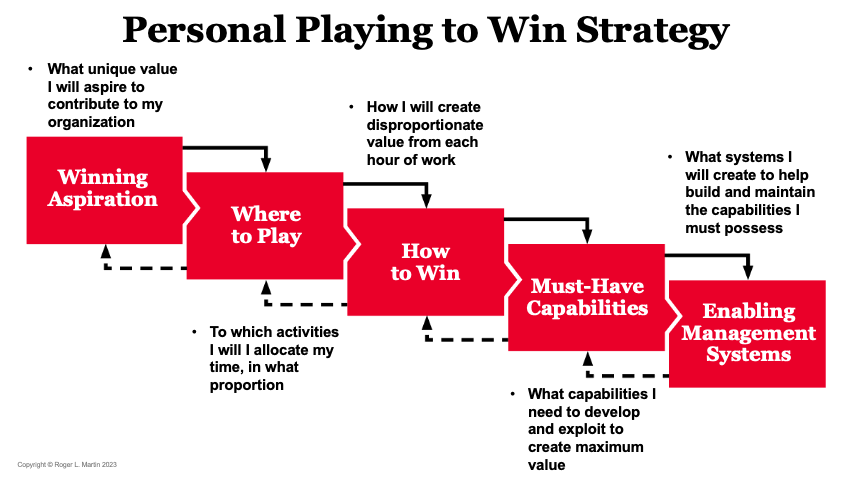
People inform me they are busy as if it is a badge of honor. For me, it is a signal that they have a weak personal Playing to Win strategy.Source: Being ‘Too Busy’ Means Your Personal Strategy Sucks | Roger Martin[…]
[T]o have an effective personal strategy, you need to be deliberative about choosing where to deploy your limited available hours in tasks that your particular set of capabilities enable you to generate a win by creating disproportionate value for your organization. And, since this doesn’t happen automatically, you need a personal management system for doing it on an ongoing basis — because on this front, eternal vigilance is the price of effectiveness.
[…]
Remember that strategy is what you do not what you say. So, even if you don’t think of yourself as having a personal Playing to Win strategy, step back and reverse engineer what it actually is based on what you actually do.
Marginally Employed
For various reasons I will explain elsewhere this post by Dan Sinker, which I read this morning, was particularly important to my life. Dan is awesome, and am thankful for his candor.
A month or so ago I was at a cookout for an old work colleague and friend. It was 100% people who I haven't seen since at least the pandemic hit, and most of them a few years even before that. And so, obviously, the first question anyone would ask is "what are you up to now," and, well, that's sort of a hard question for me to answer. As has been established on this blog before, I do a lot of things. Some of them are job-shaped, while others look, well, like an entire fictional town in Ohio. All of them are important to me and all of them are a little hard to explain.Source: Best Laid Plans | dansinker.comAnd so it was on that night that my brain—sometimes a friend, other times an enemy—responded “Well, I’m marginally employed,” before launching into a full-throated explanation of the wild world of Question Mark, Ohio to increasingly concerned onlookers.
I left the cookout feeling pretty weird, if I’m being honest. Since I’d last seen most of the folks that were there, they’d moved on to really incredible work. And here I was cobbling together bits and pieces of job-shaped things while spinning a yarn about a town plagued with disappearances. And then there was the term I used: marginally employed, which felt right but also felt a little embarrassing.
And then something happened. I talked about this on Says Who afterward and I heard from a bunch of folks who said, basically: Hey, me too. And I realized like, wait a second: I want to be doing work like I’m doing. Work that’s weird and exciting and, admittedly, hard to describe to people while also gnawing on some ribs. I don’t want to be doing a 9-5. I want to be marginally employed.
And so I made a patch. It’s really simple, just maroon on white and set in Cooper Black, my very favorite typeface. It reads, simply, “Marginally Employed.” No apologies, no frills. I love it. You might too. It’s $10 and ships free in the US.

